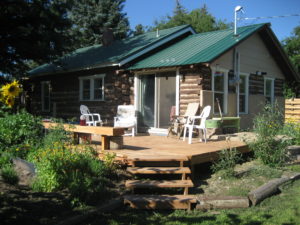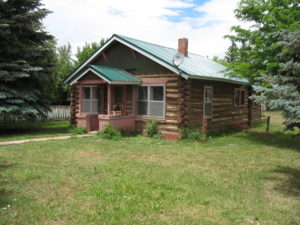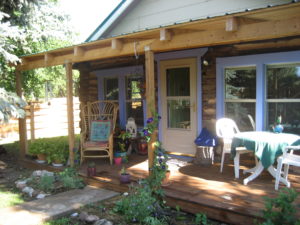by Jenny Rose | Apr 13, 2017 | Emotional Intelligence, Fear, Feelings
Last week I came down the steep stairs from my little attic aerie, sat in a chair in the living room and cried while I asked my partner if he thought I would ever have a less effortful experience of life.
It’s not that anything was really wrong. What I was feeling was an old, familiar feeling of trying to manage my life and myself as efficiently as possible and feeling worn out and unsuccessful.

Photo by Bradley Wentzel on Unsplash
Trying. Manage. Efficiently. What am I, a machine?
I was tired that evening, and worried about diminished workflow and subsequent diminished paycheck. I wasn’t seeing a way out of my work/income situation, which is a place I’ve been in for several years.
One of the things I did last week during a work shift devoid of work was join She Writes, an online community for, obviously, women writers. I’d been procrastinating about doing so for a long time.
For years, I’ve been trying to find a writing community, both locally and online. I’ve joined a professional local organization, but their programs are rarely offered up here in Central Maine, as Portland is their headquarters. I’ve tried, unsuccessfully, to find beta readers for my first book. I put up an invitation to start a writer’s group at the local library and didn’t get a single call. I tried a give and take partnership with another writer so we could read one another’s work and provide feedback, but my partner had other priorities and needed to drop out.
And, of course, I need to work for that paycheck, so my time and energy are largely gobbled up by my financial needs rather than the joyful work of my life. This produces a chronic background tension that grinds away at my soul.
Anyway, I decided the time had come and I was ready to join She Writes and see what possibilities might open up through that community. I had to apply to join.
I knew they wouldn’t take me.
They accepted me (probably some kind of mistake) and the day after I sat in the chair and cried, I had another shift with no work and began exploring She Writes. I came across a blog post titled “The Only Reason to do Anything is Love,” by Bella Mahaya Carter, and had an epiphany.
Engaging with life from a place of love rather than fear is not a new idea for me, or probably for anyone reading this. It’s the kind of thing we hear and read all the time. I would have said I do that. It’s always my intention to show up in the world with love, which is to say kindness, compassion and respect.
The wording of Carter’s post, however, indicates motivation, an internal thing, not external action. Make choices with love, not fear. Decide what to do based on love. Do nothing for fear.
Right, I thought. I treat others and myself well. Of course.
Why?
I treat others well because I think it’s effective and I’m afraid of violence, hatefulness, rejection and just plain crazy.
I treat myself well because I’m afraid to be unhealthy, unable to earn a living and/or unable to be independent.

Photo by Milada Vigerova on Unsplash
It’s all for fear. It’s not for love.
Furthermore, treating myself well doesn’t equal loving myself. I caretake my physical form like a good property manager takes care of a rental. I exercise, eat well, brush my teeth, wash my body and take care of injuries.
What I think about myself is that I disappointed my parents, drove my brother nuts (not literally!), failed two marriages and made unforgiveable mistakes as a parent. I think I’ve never made a successful career or had a good enough job. I think I’m ridiculously hard to live with. I think I eat too much, use too much hot water in the shower, like obnoxious music, try too hard and am too sensitive. I think I’m unattractive and few people want to hug or touch me. I think I’ve spent years writing a 300,000-word book that, for all I know, has less value in the world than a roll of cheap toilet paper. On sale.
Those are some of the things I’m conscious of. When I look at my fear-based choice making, it appears I also think if I don’t hold my own feet to the fire at all times I’ll become a lazy, irresponsible, selfish slacker; demanding, mean, dishonest and greedy.
Carter’s post made me realize I could hardly think of a choice, any choice, whether important or mundane, that I haven’t made based on some kind of fear. Ever. From earliest memory.
The greatest motivator in my life is and has always been fear.
Not only that, but I’ve created a whole pantheon of idols I obsessively and ceaselessly worship in order to avoid the vengeful, punitive God I’ve made out of fear. I make daily bloody and brutal sacrifices of time, energy and life to appease them, but insatiable fear just gets more and more powerful. Here are some of the idols:
I read that post on Friday. There and then I decided to start making choices based on loving and believing in myself rather than fear of consequences and see what happened.
Without leaving the chair, I asked myself what the hell I was doing messing around with a job that wasn’t meeting my needs and I was unhappy in.
On Saturday I applied and tested for a job as an independent contractor to do transcription for an online company.
On Sunday I applied and tested for a job as an independent contractor to do transcription for a second online company and was hired on the spot. I also wrote the publisher of She Writes Press and asked for help with the next step for my book manuscript.
On Monday, when I ran out of work, I began getting qualified (via testing) to do various kinds of transcription through my new job and looked up the resignation process from my current medical transcription job.
Yesterday the second online business hired me.
This morning She Writes Press wrote me back with support, suggestions, a recommended professional who might read the manuscript, and what it would cost.
The fear is not gone. In fact, it’s louder than ever because I’m challenging it on so many fronts at once. The difference is I’m not standing nose to nose with it right now. Playing with the new toy of making choices based on what’s loving for myself gives me another option, which means now I can make a real choice.
Fear is not a bad feeling. We need it to survive. It’s just that mine has grown bloated and swollen on all the power I’ve given it over the years. The bigger it gets, the more space it takes. At this point I’ve become its thing. It thinks it can do as it likes with me.
It’s wrong.
I’ve had a belly full of life based on doing things out of fear. It’s exhausting, demoralizing, joyless and hag-ridden. It doesn’t work well and I’m sick of it. When I think about it rationally, I know I don’t need to beat myself with a stick through every day for fear I’ll become lazy, selfish, etc., etc. If I was going to turn into any of those things I would have done it long ago.
How would it be if I used regard for myself as a motivator and refused to do or not do out of fear? What might a life based on doing things out of thinking well of myself look like? What if I stopped giving anything to fear?
The funny thing is life looks much the same. The difference is largely in the outwardly invisible motivation behind my choices. Am I going to relax with music or a video and stretch because that’s the right and responsible way to treat my tiresome physical needs after a long day sitting in which I earned inadequate money, or am I going to do it because I love the way it feels after a tiring day in which I worked hard, whether I earned money or not?
Life is crazy right now. Everything feels like it’s in transition. I hardly know what to concentrate on in any given moment, there’s so much on the table. Even so, now when I run out of energy in the afternoon I spend a few minutes writhing between making a choice between demanding more from myself out of fear or doing something pleasurable and relaxing. So far, every day I’ve managed to choose rest and relaxation after another wild day.
It appears I’ve begun a new practice. I didn’t know that evening I sat in the chair and cried I was standing on an important threshold. I didn’t know by the end of the week I’d have not one but two new jobs. I didn’t know I was going to finally get serious about putting my manuscript into a professional’s hands and risk failure and rejection. I didn’t know in just a couple of days I was going to begin making a habit out of rolling out of bed and stepping into the day’s embrace with curiosity and a resolve to think well of myself as I navigate, rather than wondering fearfully what would happen next and whether I would manage it adequately.
So far, so good.
Nothing more for fear.

Photo by Stephen Leonardi on Unsplash
All content on this site ©2017
Jennifer Rose
except where otherwise noted
by Jenny Rose | Mar 30, 2017 | Emotional Intelligence, Feelings
In the last couple of years, a lid has been gradually slipping off a container in my mind labeled ‘BOREDOM,’ and I suddenly realize the contents of the can are now moving into all the cracks and folds of my memories and experience.
I don’t have much interest in boredom. I’m never bored and I’m greatly irritated by people who are. When I expressed boredom as I child I was either given something “productive” to do or told sometimes everyone has to do things they don’t want to do.
As a parent, when my kids expressed boredom, I gave them a long list of tasks or “productive” things they could do to help me. They usually declined, but they also learned quickly to stop saying they were bored.
I’ve often been told I’m boring.

Photo by Annie Spratt on Unsplash
There. That’s all I have to say about boredom.
Life was much more cut and dried before I became educated in emotional intelligence. Now I’m suspicious of cut and dried, especially if it has to do with feelings, patterns in my life or things that keep showing up. Boredom keeps showing up. People say they’re bored and I feel disgusted. People say they do self-destructive things because they’re bored and that excuse infuriates me. I take the boredom of others personally, as though I’m not entertaining or interesting enough to keep them engaged.
If I’m not interested in boredom, I ask myself, why does it make me so mad, and why does it keep catching my attention?
Why, indeed.
A couple of days ago I decided this week’s post would be about boredom, so I really started to think about it. I tossed around the concept of boredom with my partner. I thought about all the places it’s shown up in past relationships. I sat down and Googled boredom and looked at articles, quotes, memes, images and definitions.
I can’t tell you how often I’ve come to the page, either to write or research about something out there — a behavior or pattern I observe around me in other people — and discovered it’s not out there at all, at least not exclusively. It’s in here.
Remember what I said a minute ago? “I’m never bored.”
I’m suddenly realizing that’s not true. In fact, I suspect I’ve been chronically bored my whole life. The feeling of boredom, along with so many other feelings, simply got denied. It wasn’t until I started living more authentically here in Maine and stopped being bored that I could begin to see the colossal depths of my previous boredom.
Naturally, I’ve felt enraged when others express feeling bored while I can’t.
But why can’t I express it? What’s so shameful about boredom?
Oh, baby.

Photo by Jason Rosewell on Unsplash
First of all, being bored means you’re not working hard enough. You’re not being productive. You’re wasting time. You’re useless! You’re lazy! You’re a quitter! You’re irresponsible! You’re letting others down! You’re not pulling your weight! You’re a burden! You’re a failure! (This eventually trails away into a wild-eyed, gibbering mental shriek.)
When all the arm-waving drooling hysteria stops and I can think rationally again, what I’m left with is BUSY=GOOD and BOREDOM=BAD. This has the look and feel of first-grade logic to me, and I’m skeptical. I’ve spent a lot of my life staying busy in order to please other people and a lot of that busy was dead boring. School, for example. Busy and bored are not opposites. Busy without purpose is a recipe for compulsivity. On the other hand, the condition of being undisturbed and private with a book, paper and writing or coloring pens or even just a window and a cat with nothing in particular to do is a real pleasure.

Photo by Danny Postma on Unsplash
Somehow, somewhere along the way, boredom became the enemy in our culture. It’s a whine, a complaint, a danger and a discomfort to be avoided. It’s a weakness, even a sin (if you think in such terms). Boredom is a condition that must be fixed. Bored children get into trouble. Bored adults are not productive. Boredom is an excuse to use and abuse substance. People eat out of boredom. People have affairs out of boredom. Boredom, in fact, is to blame for a lot of undesirable behavior and choices.
Really? I don’t accept this. I’ve learned feelings — all feelings — can be thought of as value-equal data. We’re human. We have feelings. Some are more uncomfortable than others, but isn’t that largely a product of the thoughts and judgements we attach to them? Feeling a feeling doesn’t mean we have to act it out in ways to hurt others or ourselves. If we make destructive choices, our feelings are not the problem. What we do with our feelings is the problem.
It follows then, if I’m bored and I can call the feeling by name and recognize it, there’s information there for me. What is my boredom telling me? Here are some things I associate with my own boredom:
- I’m not interested.
- I’m not engaged.
- I’m not authentic.
- I don’t feel a connection.
- I can’t make a contribution.
- It’s too easy; I know how to do this; I can do more.
- I don’t understand.
- I’m overstimulated.
- I’m exhausted or ill.
- I’m overwhelmed with some other painful feeling, like fear, rage or grief, I’m refusing to deal with.
- I have a boundary problem; I’m taking on something belonging to someone else.
- I’ve been here and done this — not doing it again!
- My needs are not being met.
- I feel disempowered.
- I’m not in the right place.
- I feel limited.
- I can’t be curious or creative.
- I’m not safe.
This entire list is a map informing me where I’ve been, where I am and where I might go next. The feeling of boredom is the ground I stand on to read the map. My boredom doesn’t need to be fixed. There’s nothing shameful about it. On the contrary, it holds essential information and experience for me. It defines choices and supports power. Busy can’t create this essential space and quiet, but boredom can.
So much for not expressing boredom because it’s bad and busy is good. What else stood in my way all these years?
False Gods.
You see, I’m female. (By which I mean uterus, ovaries and menses.) Good girls, nice girls aren’t bored — ever — by males, including but not limited to male teachers, male family members, male romantic/sexual partners, male classmates and colleagues, and male bosses.
Now, before anyone climbs up on their high horse, understand I don’t hate men. Not at all. I’ve historically gotten along better with men than women, in fact. Also, I know things are different now than they were in the 60s and 70s when I was being socialized — sort of. There’s a lot more awareness and discussion of feminism and sexual politics.
However, a big part of my training had to do with “respect,” (also loyalty, responsibility and duty) and just about the only person not included in those I was taught to “respect” was myself. Respect was demonstrated by things like being silent while the men spoke, obedience, and being properly grateful for and attentive to mansplaining . Respect meant adapting, adjusting, and limiting myself so as not to challenge, threaten or compete with men. My role was to learn to “act like a lady” and be compliant, sweet and attractive.
You might not have noticed, but that training wasn’t notably successful.
Boredom and respect are not a happy team, so of course I kicked boredom to the curb. Respect meant love, validation, tribe, straight A’s, husband, children, a good job and a normal life. Boredom with addiction, violence, abuse, rigid thinking, inability to grow, absent creativity and curiosity, uninspired sex, toddler-level communication skills, power and control games, mind fuckery, omnipresent TV, unending housework and financial grind was absolutely out of the question.
Until now.
As for other people calling me boring, we’ve already covered that in a previous post. It’s a projection. My feeling of boredom is not about others and their boredom is not about me. I’ve been a lot of things in my life, but boring isn’t one of them.
That empty can in my mind labeled ‘BOREDOM’ was filled with something I want and need. Who knew? Going forward, I’m reclaiming my boredom. I’m welcoming it like the wise old friend it is, naming it, honoring it, embracing it, standing hip-deep in it and reading the map of my life to chart a course for what I’d like to do next.
And I will never, ever again try to fix, discourage, stifle, diminish or deny someone else’s boredom. I will instead congratulate them for feeling such a vital, vibrant feeling and ask them my favorite question:
“What would you like to do now?”

Photo by Joshua Rawson-Harris on Unsplash
All content on this site ©2017
Jennifer Rose
except where otherwise noted
by Jenny Rose | Mar 23, 2017 | A Flourishing Woman, The Journey
When I came to Maine from Colorado, I left behind a small log house on four lots in a mountain town of about 1,000 people. I was fortunate enough to find good renters. I’d never been a landlady before, but the prospect of renting was less overwhelming than actually trying to sell the house while making the huge transition to Maine.
My childhood consisted of moving from here to there frequently, and the constant upheaval and insecurity was hard. I didn’t really make friends or invest in any particular place, because I never knew when we would have to pack up and go again. By the time I was a teenager, my family had settled down, but by then I was getting ready to go out into the world and make a place of my own, so there still wasn’t any security.
Then I got married and had children, and finding a home was largely driven by my husband’s wants and preferences and what our young family needed, not by my own desires. It became apparent over my years of marriage that the house that appealed to me and the house that appealed to my husband were rather different in terms of location, style and layout. We moved from place to place, and I made do wherever we were — a skill I had a lot of practice with. It was the family that mattered, I told myself, not the house.
When the boys were ready for school, though, it was important to me to settle down somewhere, as I didn’t want them to have the experience I did of always being the new kid in school. At that point we moved to the little town referred to above, where I stayed for more than 20 years. The house we bought when we moved there sheltered us, along with dogs and cats, but I never really liked it. Once again, it had been my husband’s choice.
Fifteen years passed and I found myself alone with a cat in a big house I’d never loved that hijacked me with ghosts and memories everywhere I turned.
I sold the house, discarded a lot of stuff and, after a couple years of searching, heard of a dilapidated old log house that had been rented that was about to go on the market. One of my friends was a neighbor, and one spring morning we went to walk around it.
It needed a lot of work, but I was charmed. My friend went up 3 cement steps in the back, found the back door open, and we walked in.
It was outdated, tiny, inconvenient and badly neglected. Everything, inside and outside, was frayed, ragged, used up, dusty and dirty.
Falling in love is a strange thing. What is the complex, mysterious response a person, object or place calls from us? It’s got nothing to do with beauty or even suitability, that’s for sure, at least not for me.
I felt akin to the house. There it sat, and had been sitting for over 100 years, on a weedy and trash-filled patch of ground with large old trees around it, unloved, unseen and unappreciated. It was small and ugly and shabby. I myself had never noticed it in all my 15 years in that town.
Nobody loved or wanted it.
That’s what captured my heart.
Nobody loved it.
But what if somebody did? What if somebody wanted it, cleaned it up, gave it some care and attention?
 So I bought it, remodeled one end, gave it new windows and a new front door. I had the wood floors stripped, sanded and sealed. I insulated, put in a little wood stove, patched and painted. I raked up bags and bags of trash and built garden beds out of cardboard, newspaper, huge loads of manure and fill dirt, moldy straw and hay and compost. I hung birdfeeders and wind chimes in the trees.
So I bought it, remodeled one end, gave it new windows and a new front door. I had the wood floors stripped, sanded and sealed. I insulated, put in a little wood stove, patched and painted. I raked up bags and bags of trash and built garden beds out of cardboard, newspaper, huge loads of manure and fill dirt, moldy straw and hay and compost. I hung birdfeeders and wind chimes in the trees.
I didn’t know it then, but in loving that house and bringing it back to life, I was taking the first steps in loving myself, and eventually leaving that little town for a bigger, wider world.
I lived in the house for five years, and I was struck, over and over again, by how the house and land responded to every bit of attention I gave them. They never shrank away from me. I never failed or disappointed. The place blossomed. It bloomed. The garden grew. The trees filled with birds. Sunlight poured in the new windows and turned the old floor to the color of honey. Indoor plants throve on the wide windowsills.
The house was like a mirror. It reflected back to me creativity, color, light, modest luxury, simplicity. As I lived my life in it I saw myself differently than I ever had before. I had made a beautiful place, peaceful and welcoming.
For the first time, I thought maybe I had something to offer the world. Maybe I was of some use after all.
In my head, it was all settled. After nearly 50 years of moving and being subject to someone else’s needs and choices, I had come home. For the first time in my life I allowed myself to put down deep, deep roots. I filled the house with my music, my books, my spiritual work, my art, my hopes, dreams, desires, fears and griefs. I joyfully lived without clutter, piles, and collections of junk that weren’t mine. I burned candles and incense and had flowers by the kitchen sink and in the bathroom.
Never again would I have to move. I was safe. I laid in bed at night and felt the house around me like sheltering wings. I had at last realized the deepest and most painful desire of my life — a real home. I would live the rest of my days in safety, serenity and security. The house and I belonged to each other and took care of one another.
Last month I put the house up for sale, and last week it went under contract.
I don’t know how to express all the thoughts and feelings that led me from that place to this. To say I emotionally outgrew it feels true. To say my old life began to feel much too small is also true. Gradually, I understood a house can’t provide me with the safety I’m always looking for, after all. I thought I’d reached the highest peak of my own desire and possibility, but when I got there and looked around, I began to see higher peaks still.
I’d created a home and called it a life.
I was also aware my love for the house exceeded my love for myself. Part of me still waited for someone to show up and do for me what I did for the house. Inside me, a sweet maiden stayed powerless and waiting for a prince on a white horse, but I wasn’t a maiden. I was a menopausal woman, expert in the art of pleasing people, with two adult children, two divorces and a history of abuse. It was too late for the prince thing, and I was bored by it anyway. What was a downy-faced idiot prince going to do with a woman like me?
I recognized the more mature (ahem!) parts of me were simply lonely for healthy, meaningful connection with other people, and no house, no matter how beautiful, comfortable or beloved, could give me that.
Then there was the anguished voice from deep inside, imprisoned somewhere behind my rib cage, that kept saying “I can do more than this! I can be more than this!”
Anyway, I chose to leave Colorado, the house and my life there, though it was like tearing myself in half. Still, I’ve never regretted that choice, and I know now that I don’t want to go back to my old life and that little town — even if I could.
The house I’m in now hardly notices me. It needs nothing from me, and nothing I can do will fix all that needs fixing and update all that needs updating. This is frustrating, at times infuriating, and oddly peaceful. All the energy and love I used to give my home is now going into my writing and into shaping myself and a new kind of life. In a strange and convoluted way, leaving the home of my dreams has at last brought me into direct, intentional and mindful relationship with…me.
I wonder if perhaps I’m the home and safety I’ve always been searching for. How ironic.
I’ve been weeping on and off as I let go of my house. I want to do it, and it hurts. I wonder if I’ll ever have that again — such a perfect home. I wonder about the new owner, who is also a single woman. I hope she feels as sheltered and nurtured there as I did. I hope she’ll touch the trees and feed the birds and glory in the iris and roses and clematis. I hope the owls will wake her in the deep winter nights, calling from the huge pine trees in front. I hope she draws close to herself as she sits in the sun where I sat, sleeps under the ceiling I had patched and painted myself, feeds the wood stove, washes dishes and relaxes in the bathtub.
I hope she and the house will love one another and be happy together.

All content on this site ©2017
Jennifer Rose
except where otherwise noted
by Jenny Rose | Feb 9, 2017 | A Flourishing Woman, Self-Love
I recently read a brilliant essay on tolerance that clarified for me why I haven’t always experienced successful outcomes while practicing it! Here’s a quote to think about from that article:
“[Tolerance] is an agreement to live in peace, not an agreement to be peaceful no matter the conduct of others. A peace treaty is not a suicide pact.” –Yonatan Zunger, ‘Tolerance is not a Moral Precept’

Photo by 小胖 车 on Unsplash
I’ve found that one of the many unpleasant effects of pleasing people, trying hard, being compliant and demonstrating unfailing compassion and kindness is that it’s stunted my emotional growth. It’s made me weak, naïve and dependent. It’s taught me to be powerless.
At this point in my life I’m making different choices, and as I do that I’m losing my fuzzy-headed, goody-two-shoes, sweet maiden aspect and becoming much clearer about who I am and what I believe in.
I’m not the only one, either. My second-hand exposure to social media through my partner, as well as my own reading of blogs, articles and essays, demonstrates loud and clear that many of us are in the process of refocusing our beliefs and values. Just yesterday I read an article about the devastating impact of the presidential election on close relationships and social media communities, as well as the way it’s opened up new connections.
As I listen, watch, read, write and think about it all, I return, again and again, to the conclusion that we’re all dealing with the same underlying ideas and issues. I know there’s a lot of heated and poisonous ideology out there about race and ethnicity, sexuality and gender politics, religion, and even what we eat, but underneath all that distracting noise are the same issues of tolerance and intolerance, power and identity, and fear.
I’ve written previously about reciprocity. When I read Zunger’s post, I immediately understood why my practice of tolerance has had, in some cases, quite devastating results. Once again, I was extending something I wasn’t receiving in return. Having been well trained (and slightly dim) it didn’t occur to me before that it’s not my responsibility to meet intolerance and disregard for my own boundaries with continuing tolerance. I’ve clung to the dangerous belief that if I just model and demonstrate well, the other party or parties will get it, and want to live in a more peaceful and effective way (my way, of course!)
After all, I don’t want to stoop to their level!
Ick.

Photo by John Salvino on Unsplash
This is a pretty effective set of shackles. Like many women, I’ve accepted them meekly for most of my life.
I’m bored with that now. It’s never worked well. It’s always left me terribly and painfully vulnerable. Turn the other cheek sounds like a lovely ideal, but in practice it sucks. In my study of combatives, I’ve found another option: Go in peace, but if a predator attacks you, be so explosively aggressive you become the predator and they become the prey. Take them out of commission as fast and effectively as possible and get away from them. Permanently.
I know, I know. Unattractive. Not nice. Being part of the problem rather than the solution. Violence solves nothing.

Photo by Jason Blackeye on Unsplash
That’s all fine, if it works for you.
It hasn’t worked for me. I’m not sure why it’s unattractive and wrong to defend myself (or others), except, of course, from the predator’s point of view.
I don’t care what the predator thinks. Predators have to take their lumps, just like the rest of us.
It seems these days going in peace means having no opinions, asking no questions, voicing no disagreement, stating no beliefs and citing no personal experience. There’s sure to be someone who will step in and try to shut us down with violence, abuse and threats if we speak up.
I love the idea of tolerance as a peace treaty. It gives me everything I need. It accommodates my intention to seek and support connection. It allows me to continue to be completely disinterested in someone’s religion, sexual preference, gender experience, physical anatomy, race, ethnicity, diet or reproductive choices as a criterion for judgement. Tolerance as a peace treaty leaves ample room for the things I do care about — authenticity, compassion, power-with rather than power-over, the desire to connect. It’s a peace treaty I can honor whole-heartedly.
Right up until someone tells me to shut up and sit down, make myself small, stop asking questions. Right up until someone tells me what to believe, what spiritual framework to use, what to think, what agenda to accept, what to do with my body and what my boundaries should be. Right up until I feel uncomfortable, in fact. Then the peace treaty is broken, and I give myself permission to exit, quietly if allowed and like a fighting tigress if hindered.
Tolerance is not an expression of weakness. It’s not permission to use and abuse. It’s not an agreement to abdicate self-defense. It’s not a suicide pact.
Nobody is entitled to tolerance.
Tolerance is a gift that must be both given and received. Let’s be worthy of it.

Photo by Evan Kirby on Unsplash
All content on this site ©2017
Jennifer Rose
except where otherwise noted
by Jenny Rose | Feb 2, 2017 | Contribution, Emotional Intelligence
This week’s post is suspended between two stories. The first one is the old Greek myth of Sisyphus.
Sisyphus was a crafty and deceitful king who craved complete power. In his pursuit of power, he offended many men and gods and was eventually punished by being sent to the underworld and forced to roll a huge boulder up a steep hill. The boulder was enchanted, however, to roll back down the hill (over Sisyphus, in some versions) just before it reached the top. Thus, Sisyphus was doomed to repeat the same unending and futile task forever.

Photo by Tommy Lisbin on Unsplash
Sisyphus has captured the imagination of many writers, philosophers and artists, and there are several variations and interpretations of his story. If you’re interested, you can follow the link to to Wiki and read more.
Sisyphus is on my mind this week, not only because his story suggests to me the inevitability of rising and falling cycles, but also because his punishment was to forever try and fail.
His punishment was to forever try.
Huh.

Photo by Casey Horner on Unsplash
I’m a product of a culture that taught me certain core truths about life. One has a responsibility to help others. Everyone has to do things they don’t want to do. One must never give up. One must try one’s best. We’re all in a train behind a little engine that puffs, “I think I can, I think I can, I think I can,” and that’s the right place to be, the admirable, ethical, moral, adult, acceptable, responsible, side-of-the-angels place to be. Good people try and try and try. They don’t despair, they don’t give up and they don’t say it’s too hard, I can’t or, most unforgiveable of all — I won’t.
No is not an option.
The truth is one of the things I least like about myself is that I can always be counted on to try my best. I don’t mean work hard. I mean try hard. Trying is certainly hard work. It’s sucked up most of my life in terms of time and energy. A lifetime of trying, though, has produced less of value to me, and I suspect to others, than an hour of work at writing, dancing, gardening, making love, playing with a child or even scrubbing the kitchen floor.
In the last ten days, I’ve been living right alongside Sisyphus. In the last ten days, I’ve meticulously gone through headlines, articles, links, petitions, news and requests for action in my email, not once but two or three times a day, because I want to help. I want to do something that matters. I want to make a difference. In the last ten days, I’ve intentionally and consciously been present, engaged, interactive, interested in what my partner is thinking and talking about, which has been largely political news, because I want to be a good partner. I want to demonstrate I’m brave and strong and intelligent enough to be part of the conversation going on in the world.
In the last ten days, I’ve privately and quietly despaired, lost sleep, felt inadequate, lost my center, lost my peace, felt gnawing anxiety and been deeply ashamed of who I am.
I’ve tried so hard.
I’ve failed so hard.
It’s not working. I can’t live like this. I’ve been pushing that rock up the hill as bravely as I can, but it just keeps rolling back down. I’m exhausted, bruised, battered, my fingernails are torn and I’m quickly losing any desire to be engaged with life.
However, oddly, one thing is working.
A couple of weeks ago, I went to a self-defense class at a local community center. The activities director happened to be there, and on an impulse I introduced myself and asked him if he’d be interested in working with me to start a community dance group. We fell into conversation, one thing led to another and as I write this, advertising is in process, flyers are getting printed, and somehow, I’m scheduled to start up a dance group in March, a thing I’ve long wanted to do in order the create the kind of healthy, inclusive community I’m starving for.
I didn’t try at all. It just kind of happened and I went along for the ride. I’ve spent hours and hours building dance playlists, but that wasn’t trying. I wanted to do it. I loved doing it. Music instead of current news? Lead me to it!
So what is it with this trying thing that’s driven so much of my life? I can’t remember a single time trying hard resulted in an outcome I wanted. It seems to me whatever happens, happens. Things always and inevitably turn out the way they turn out. I may have occasionally bought some time. I may have kept things glued together with my frantic trying longer than they would have otherwise, but was that a good thing, or in the end did I just make the cost higher for myself and everyone else?
All the really good things I can remember in my life just happened. I didn’t plot, plan, manipulate, force or otherwise try. I was simply living my life.
And what about the punishment piece? Sisyphus, by all accounts, was not a nice man, and I don’t waste much pity on him, but what about me? Endless, futile trying certainly feels like a punishment. Why have I always accepted that? Why haven’t I been able to choose to stop?
The truth is I try so hard because I feel like I have to make up for what a difficult, noncompliant, hypersensitive, disappointing, needy, dramatic, sensual person I am. I know I’ll never please or get it right, so all I have is knowing I tried as hard as I could. The world is filled with talented, creative, loving, generous, kind people. They don’t have to try to make the world a better place. The world is a better place because they live in it.
I’m not like them. I’m broken.
It’s not like I can just not try to make up for being broken!
If I don’t try, then what is there?
Which leads me to the second story, which I can’t find this morning, but I know is here somewhere in my library!
A student approached the master and said, “I work with disabled children and their families. Master, there’s so much difficulty for these people! I want to help, to make things better for them! What should I do? How can I best relieve their suffering?”
The master replied, “With no thought of help.”

Photo by Stephen Leonardi on Unsplash
All content on this site ©2017
Jennifer Rose
except where otherwise noted

















